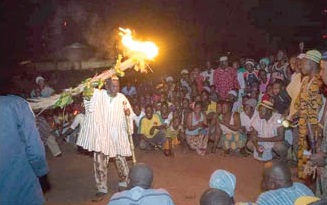
Bugum Festival: Fire celebration with varied origins
On August 7, descendants of the Mole-Dagbani Kingdom comprising Mamprusis, Mossis, Dagombas, Nanumbas and Gonjas will mark the annual fire (Bugum) Festival with an impressive display of their rich cultural heritage.
The festival, which is a significant historical event on the Mole-Dagbani lunar calendar, is celebrated amid chanting, dancing, the firing of muskets, lighting of fire and marching through the principal streets.
Advertisement
The high points of the festival would be at the palaces of overlords and chiefs of the various ethnic groups, where rituals would be performed to signify the commencement of the festival.
With lighted torches and machetes raised above their sweaty bodies and talismans and cow tails dangling on their arms and waists, the ecstatic men and women would dance energetically deep into the night.
History
History has is it that, the commemoration of the festival began after the son of a great king in the olden days Mole-Dagbani Kingdom went missing and the entire community was dispatched to search for him in the night with torches, amid chanting and drumming.
After a thorough search, the volunteers found the prince deeply asleep under a tree and took him to the eminent king’s palace.
However, the king, out of dismay, declared the tree an evil tree for taking his son away.
Individuals who helped in the search for the prince were made to throw their lighted torches at the ‘evil tree’ in order to shame it, and the king set the day for celebration.
Another school of thought has it that, the annual festival derived its source from Islam and is celebrated on the night of the ninth day of the Islamic month of Muha-ram, which is the first month of the Islamic lunar calendar and marks the beginning of the year.
It is also said that the Bugum Festival signifies the victory of Prophet Moses over Pharaoh and also God’s blessing on Prophet Noah for the smooth sailing of His ark.
Activities
During the period of the festival, people buy animals to pacify their gods and strengthen their spiritual powers. The celebrants start preparing for the festival three days before it begins.
On the day of the event, they gather at the palace of the overlords and chiefs for them to light the first thatch, after which they join in the fire lighting. The lighted thatches are finally disposed of in a thicket.
Those who cannot resist the thunderous beating of the gong-gong drums (ziem), join the revellers to dance away the night amid the incessant firing of muskets and fireworks.
Significance
Explaining the significance of the festival in an interview with the Daily Graphic, a traditional historian, Badigamsira Inusah Abdul-Majeed, said the Bugum month marks the beginning of the year according to the Mole-Dagbani descendants.
He indicated that a day after the festival, the Imam would go to the palace of the king and the various chiefs in the kingdom to perform a ritual called “Sabri Lɔrigi” and prophesy what would happen in the ensuing year.
“The “Sabri Lɔrigiri” is very important in our culture because the Imam will prophesy what will happen in the ensuing year and also tell the king/chief the supplications that will be made for the progress of the kingdom to prevent any plaque from befalling the kingdom,” he said.
Mr Abdul-Majeed noted that, though there were several narrations regarding the history of the festival, the people of Mole-Dagbani were stuck to that of the missing son of the king.
Tourism
During this period, revellers and people from all walks of life often travel to the northern part of the country to witness the exciting festival.
Considering the euphoria and the nostalgic history of the fire festival, Mr Abdul-Majeed emphasised the need for authorities to take a critical look at how they could brand the festival to boost tourism in the area.
Writer’s email:[email protected]




